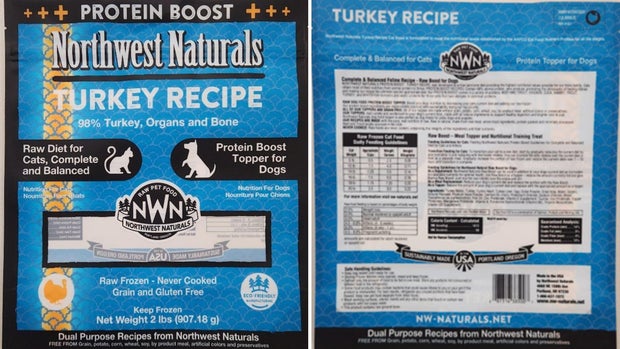Los Angeles county public health officials have issued a new warning to pet owners to stop feeding dogs and cats raw pet food after the H5N1 bird flu virus was found in product samples.
“The Los Angeles County Department of Public Health is advising residents to not feed their pets Monarch Raw Pet Food sold at several farmers markets in California,” the agency said, noting that an L.A. county house cat that was fed the product had been confirmed to have the virus. Four other cats from the same home were “presumed to have also been positive for H5 bird flu after consuming the product.”
The health department urged residents who fed their pets the Monarch raw food products or any other raw meat or dairy items and noticed their animal exhibiting any unusual behavior to immediately contact their veterinarian.
“Residents should avoid consumption of all raw milk and raw meat products and not feed these to their pets,” the agency stressed in its statement Tuesday.
Cats infected with H5N1 bird flu can develop severe illness with symptoms ranging from neurological changes and respiratory problems to liver disease, which can rapidly progress to death.
The health agency said there had been no human cases of bird flu associated with exposure to these cats yet identified.
The Los Angeles health agency did not mention any formal recall of the Monarch products on Tuesday, and the company also provided no information about a recall, or the bird flu cases on its website.
Warning comes after previous raw pet food recall over bird flu
The death of an Oregon house cat and a recent pet food recall had already raised questions about the ongoing outbreak of bird flu and how people can protect their pets.
Northwest Naturals, a pet food company in Portland, Oregon, announced a voluntary recall Tuesday of one batch of its 2-pound Feline Turkey Recipe raw frozen pet food after it tested positive for the virus. The product was sold in Arizona, California, Colorado, Florida, Georgia, Illinois, Maryland, Michigan, Minnesota, Pennsylvania, Rhode Island and Wisconsin, as well as Canada’s British Columbia.
Northwest Naturals
The recalled food has “best if used by” dates of May 21, 2026, and June 23, 2026. Consumers should throw it away and contact the place of purchase for a refund.
Bird flu has been spreading for years in wild birds, chickens, turkeys and many other animals. It was first confirmed in U.S. dairy cattle in March.
The virus has been causing sporadic, mostly mild illnesses in people in the U.S., and nearly all of those infected worked on dairy or poultry farms. When the virus is found, every bird on a farm is killed to limit the spread of the disease.
Top vet warns against raw food for pets
Oregon health officials traced the cat’s illness to the frozen Northwest Naturals cat food that contained raw turkey. Virus recovered from the recalled pet food and the infected cat matched.
Some pet owners feed their animals raw meat, but that can be dangerous, even fatal for the animals, said Dr. Michael Q. Bailey, president-elect of the American Veterinary Medical Association. Cooking meat or pasteurizing raw milk destroys the bird flu virus and other disease-causing germs.
“Raw milk, raw meat products can be and are a vector for carrying this virus,” he said.
Though cases of infection are rare, cats seem especially susceptible to the bird flu virus, or Type A H5N1. Even before the cattle outbreak, there were feline cases linked to wild birds or poultry. Since March, dozens of cats have caught the virus. These include barn and feral cats, indoor cats, and big cats in zoos and in the wild.
Dogs seem to be less vulnerable than cats, but they should eat only thoroughly cooked foods, Bailey said.
Cats should not drink unpasteurized dairy products or eat raw meat, Bailey said, and pet owners should keep cats away from wild birds, livestock and poultry.
Don’t let them wander freely in the outdoors, he said, “because you don’t know what they’re getting into. Cats are natural hunters, and one of the animals they love to hunt are birds.”
Cat owner worried about bird flu? Here’s what to know.
Experts say people should avoid touching sick or dead birds, and thoroughly wash your hands after handling poultry or animals.
Cats sick with bird flu might experience loss of appetite, lethargy and fever.
If your cat is usually playful and likes to look out the window, but instead has been sleeping all the time or hiding from you, take note, Bailey said. “There’s something wrong,” he said.
They could have reddened or inflamed eyes and discharge from the eyes and nose. They might have difficulty breathing or have tremors or seizures.
If your cat is sick, call your veterinary clinic and keep the cat away from anyone with a weakened immune system.
Can pets transmit bird flu to owners?
The Centers for Disease Control and Prevention says it’s unlikely a pet owner wiget sick with bird flu through direct contact with an infected pet, but it is possible.
The health agency noted that in 2016, the spread of bird flu from a cat to a person was reported in New York City. The infected individual, a veterinarian, had mild flu symptoms after prolonged exposure to sick cats without using personal protective equipment.
contributed to this report.



